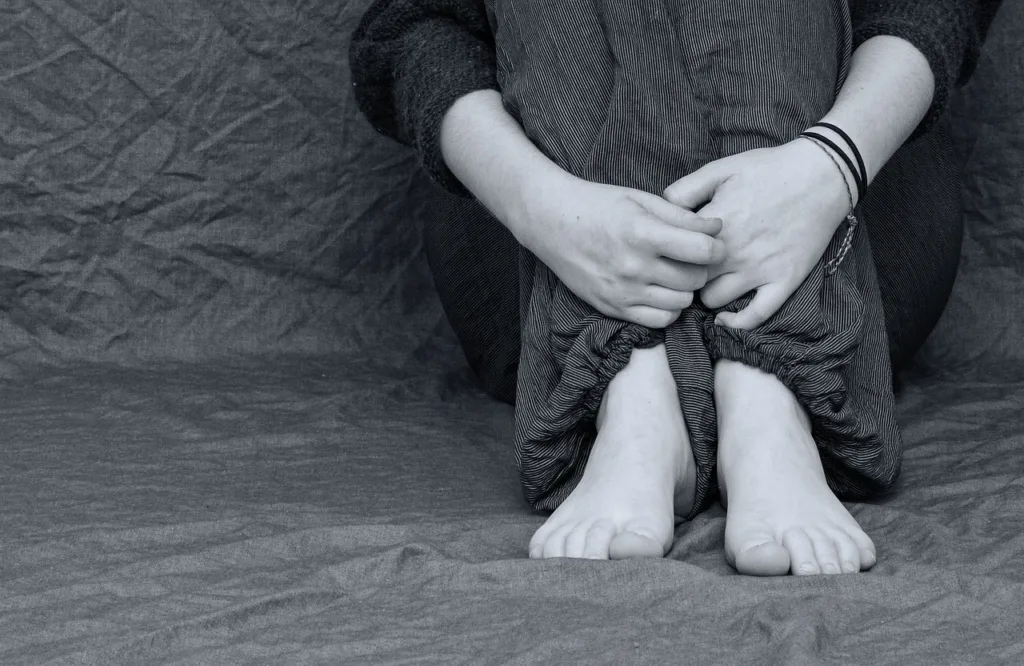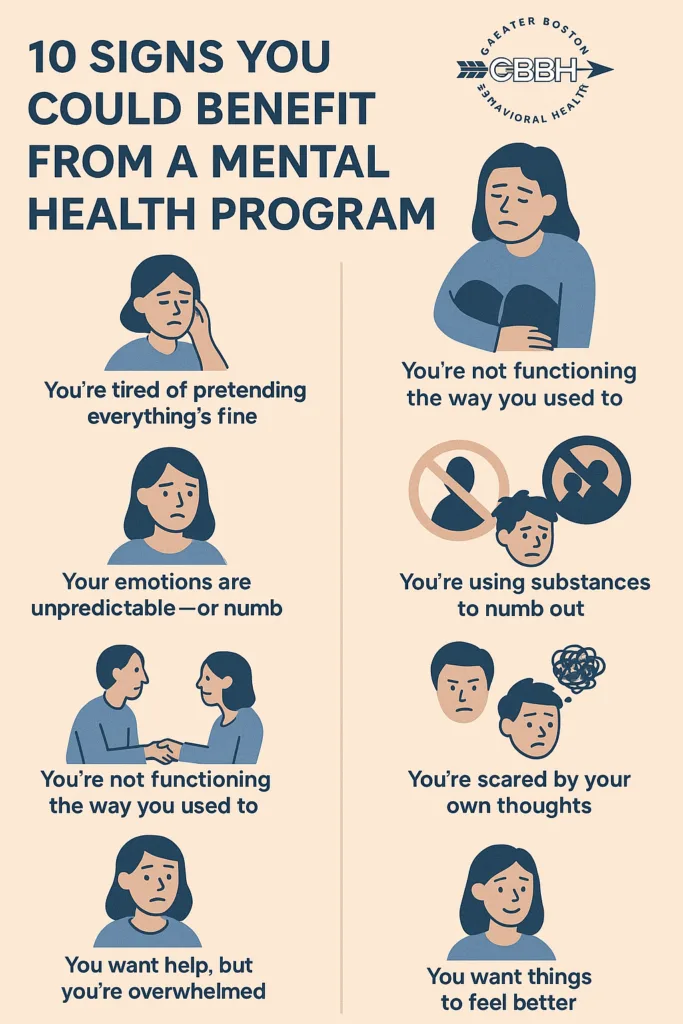When your emotional wellbeing starts slipping through your fingers, the last thing you want is more pressure to “just hold it together.” If you’re reading this, you might already know something’s off—but you’re not sure what to do next. That’s OK. Getting curious about support is a powerful first step.
As a counselor, I’ve worked with countless people in the Boston area who’ve felt exactly like you—uncertain, overwhelmed, but quietly hoping for something better. A structured mental health program isn’t just for people in crisis. It’s for anyone who’s ready to stop surviving and start feeling supported.
Here are 10 signs that might mean it’s time to consider that next step.
1. You’re tired of pretending everything’s fine
Holding it together on the outside while struggling internally is exhausting. If you’re showing up for work, family, or school but falling apart in private, it’s a sign your coping mechanisms are maxed out. Structured programs give you a break from performing and let you focus on healing.
2. You keep telling yourself, “It’s not that bad”
This one’s tricky. Mental health challenges don’t always scream—they whisper. Maybe you’re not in a full-blown crisis, but you’re also not okay. Programs aren’t reserved for emergencies. They’re for moments like this—when you know something needs to change, even if you can’t name exactly what.
3. Your emotions are unpredictable—or numb
Some days you feel overwhelmed by anxiety, sadness, or anger. Other days you feel… nothing. This emotional rollercoaster or emptiness can point to depression, trauma, or other underlying conditions. A mental health program helps regulate emotions through therapy, routine, and support.
4. You’ve tried therapy, but you’re still stuck
Maybe you’ve seen a therapist weekly, made progress, and then hit a wall. That doesn’t mean you failed. Sometimes, what we need is more frequent support—daily groups, skill-building, and structured accountability that a higher level of care provides.
5. You’re not functioning the way you used to
When everyday tasks—getting out of bed, brushing your teeth, sending emails—start to feel like climbing a mountain, it’s not about willpower. It’s often your mind and body asking for help. Programs provide practical, structured support so you don’t have to figure it out alone.
6. You’re withdrawing from friends, family, or activities you used to enjoy
Isolation can feel safer when you’re struggling. But over time, it deepens the loneliness and disconnection that mental health programs are designed to treat. Being in community—even just a small therapy group—can gently rebuild trust and connection.
7. You’re using substances or distractions to numb out
Not everyone who drinks or uses cannabis to cope has a substance use disorder—but even low-level reliance can mask mental health struggles. Programs often integrate education around healthy coping, especially for those who feel caught between “functioning” and “suffering.”
8. You’re scared by your own thoughts
Intrusive thoughts, hopelessness, or suicidal ideation can feel terrifying to admit. If you’ve had moments where your thoughts scared you, please know that structured care can help. You’re not broken. You’re not alone. And there are safe, respectful places to talk about it.
9. You want help, but you’re overwhelmed by where to start
This is one of the most common barriers we hear. Knowing you need support doesn’t automatically make the next steps clear. A mental health program offers built-in structure—you show up, and the support is already there. No guesswork. No need to plan every move.
10. You want things to feel better—even if you’re not sure what that means yet
Maybe you can’t articulate exactly what you need. That’s okay. What matters is that you want something to shift. A good program isn’t about fixing you—it’s about walking beside you while you rediscover your clarity, your rhythm, your strength.
Why Choose a Mental Health Program in Boston?
Boston, MA is home to some of the most respected mental health care providers in the country. At Greater Boston Behavioral Health, we’re proud to offer flexible, evidence-based programs that meet you where you are—whether you’re working full-time, caring for family, or navigating multiple stressors.
We serve people facing anxiety, depression, trauma, grief, and emotional burnout. Many of our clients are new to care—and many felt unsure if a program was “too much” or “too soon.” That’s why we offer different levels of support, including:
- Partial Hospitalization Program (PHP): Daytime structure, clinical support, and group therapy without overnight stays
- Intensive Outpatient Program (IOP): Flexible scheduling with 3–5 days of therapy and support per week
- Outpatient Therapy and Medication Management: Ongoing support for those stepping down or needing a lighter level of care
FAQ: Mental Health Programs in Boston
What exactly happens in a mental health program?
You’ll participate in daily or weekly sessions that include group therapy, individual counseling, skill-building (like DBT or CBT), and sometimes medication management. Programs offer structure, accountability, and peer support in a judgment-free setting.
Do I have to stop working or going to school to attend?
Not necessarily. Intensive Outpatient Programs (IOP) are often scheduled during evenings or flexible hours, making it possible to continue working or attending school while receiving care.
What if I start and it doesn’t feel like the right fit?
That’s okay. Part of the intake process is figuring out what level of care is most appropriate. If the program feels too intense—or not intensive enough—we’ll work with you to adjust.
Is this the same as going to the hospital?
No. Structured outpatient programs like PHP or IOP do not require overnight stays. They’re designed to provide clinical care without full hospitalization.
How do I know if I need this versus just regular therapy?
If weekly therapy hasn’t been enough, or your symptoms are affecting your ability to function day-to-day, a structured program might offer the added support you need. It doesn’t mean therapy didn’t work—it means you’re ready for more support.
You’re Not Alone—And You Don’t Have to Guess
Mental health doesn’t come with a manual. But reaching out for support is not a sign of weakness—it’s a sign of hope. Whether you’re facing burnout, depression, anxiety, or something you can’t quite name, you deserve care that meets you with respect, clarity, and real support.
Let’s talk about what support could look like. Call Greater Boston Behavioral Health today at (888) 301-8072. We’ll walk you through the options, answer your questions, and help you find the level of care that fits your life—and your needs.


